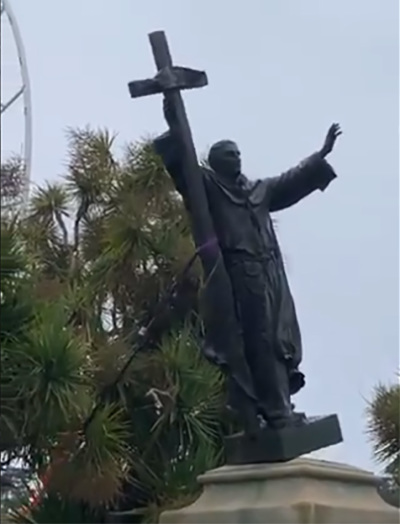Activists demand Calif. DA drop felony charges against vandals who toppled Junipero Serra statue

Months after the statue of a Catholic saint was vandalized and toppled by rioters, activists are calling on a California district attorney to drop charges against the perpetrators.
On Columbus Day last year, referred to by some as Indigenous People’s Day, a group of vandals toppled a statue of St. Junipero Serra located outside the Mission San Rafael in San Rafael, California. As The Christian Post previously reported, five people were “arrested on vandalism charges for knocking over the Serra statue, leaving only the feet attached to the base.”
According to the Marin Independent Journal, “A complaint filed by [Marin County District Attorney Lori] Frugoli’s office in November accuses five suspects of causing at least $10,000 in damage. Under state law, vandalism is considered a felony if the damage exceeds $400.”
A group called Decolonizers Defense has set up a petition calling on Frugoli to “Drop the Charges Against the Indigenous People’s Day 5.” The petition noted that felony charges were filed against five of the 50 protesters.
“5 Indigenous women and two spirit racial justice activists are being charge(d) with felonies,” read a graphic accompanying the petition. The graphic, which urged Frugoli to “Drop the Charges,” was also emblazoned with the phrase “no more monuments to murderers.”
The petition suggests that the monument's destruction was justified because Serra was “a notoriously violent mission leader known for imprisoning and enslaving Indigenous people.” It also slammed the city of San Rafael for “refusing to recognize the harms perpetrated against Indigenous people” and maintained that “this is a critical moment to resist increasing repression and support decolonial activists in your community.”
As of Thursday afternoon, the petition had garnered more than 75,420 signatures out of a goal of 150,000.
Statues of the 18th century priest were targeted because of his ties to Spanish expansion in North America. In 1769, Serra led the first group of missionaries into California.
In addition to calling on Frugoli to drop the charges against the “Indigenous People’s Day 5,” the petition offered additional suggestions on how to help support the aforementioned protesters. These tips included a call to “encourage Mission San Rafael to consider how they might begin to reconcile with the violence of their founding” and “learn about the history of the land you are on, learn about the Indigenous People it was stolen from, (and) find a way to recognize your place in this lineage and contribute to its healing.”
A letter written by a group called The Indigenous Peoples Day 5 Coalition accuses Frugoli of “targeting “ "Indigenous women and two Spirited People." According to the signatories, the charging of the five protesters constitutes a “continuation of the legacy of anti-Indigenous violence that persists to this day.”
“By charging only Indigenous people, you are aligning yourself with the dangerous trend toward repression of BIPOC activists and those speaking up against violent, genocidal figures such as Junipero Serra,” they wrote in part.
“This is the moment to take a stance in support of recognizing that the removal of this statute was in and of itself a response to the brutal and racist violence that is central to Junipero Serra’s legacy. We are writing to urge you to act in accordance with your own stated values, those of standing against racism in Marin, and drop the charges now against the Indigenous Peoples Day 5,” the letter continued.
More than 40 groups and individuals signed the letter, including First Congressional Church in Ripon, California, University of California Davis professor Erin Gray, the Ohio Women’s Alliance and CodePink Women for Peace, East Bay Chapter. The website for the Indigenous Peoples Day 5 Solidarity Coalition described Serra as a “murderous abuser of Indigenous people, notorious for imprisoning and enslaving Indigenous people in what is now known as California.”
Last summer, Bishop Robert Barron of the Roman Catholic Archdiocese of Los Angeles delivered a homily defending Serra's legacy. “Do you know in 1773, Junipero Serra made his way, of course, by foot, in constant pain from Carmel all the way to Mexico City to argue for a bill of rights for the Native peoples?” he asked.
Barron also pushed back on the depiction of “evangelization as some sort of cultural aggression,” explaining that “Serra wanted to share what he quite rightly took to be the most precious give you could ever give.”
Similarly, the California Catholic Conference of Bishops and Salvatore Cordileone, the archbishop of San Francisco, said critics of the saint were making false claims that he was involved in the genocide of indigenous people.
"St. Serra made heroic sacrifices to protect the Indigenous people of California from their Spanish conquerors, especially the soldiers," Cordileone said in a statement released in July. "Even with his infirmed leg which caused him such pain, he walked all the way to Mexico City to obtain special faculties of governance from the Viceroy of Spain in order to discipline the military who were abusing the Indians. And then he walked back to California.
"And lest there be any doubt, we have a physical reminder to this day: everywhere there is a presidio (soldiers’ barracks) associated with a mission in the chain of 21 missions that he founded, the presidio is miles away from the mission itself and the school. St. Junipero Serra also offered them the best thing he had: the knowledge and love of Jesus Christ, which he and his fellow Franciscan friars did through education, health care, and training in the agrarian arts, he added.





















